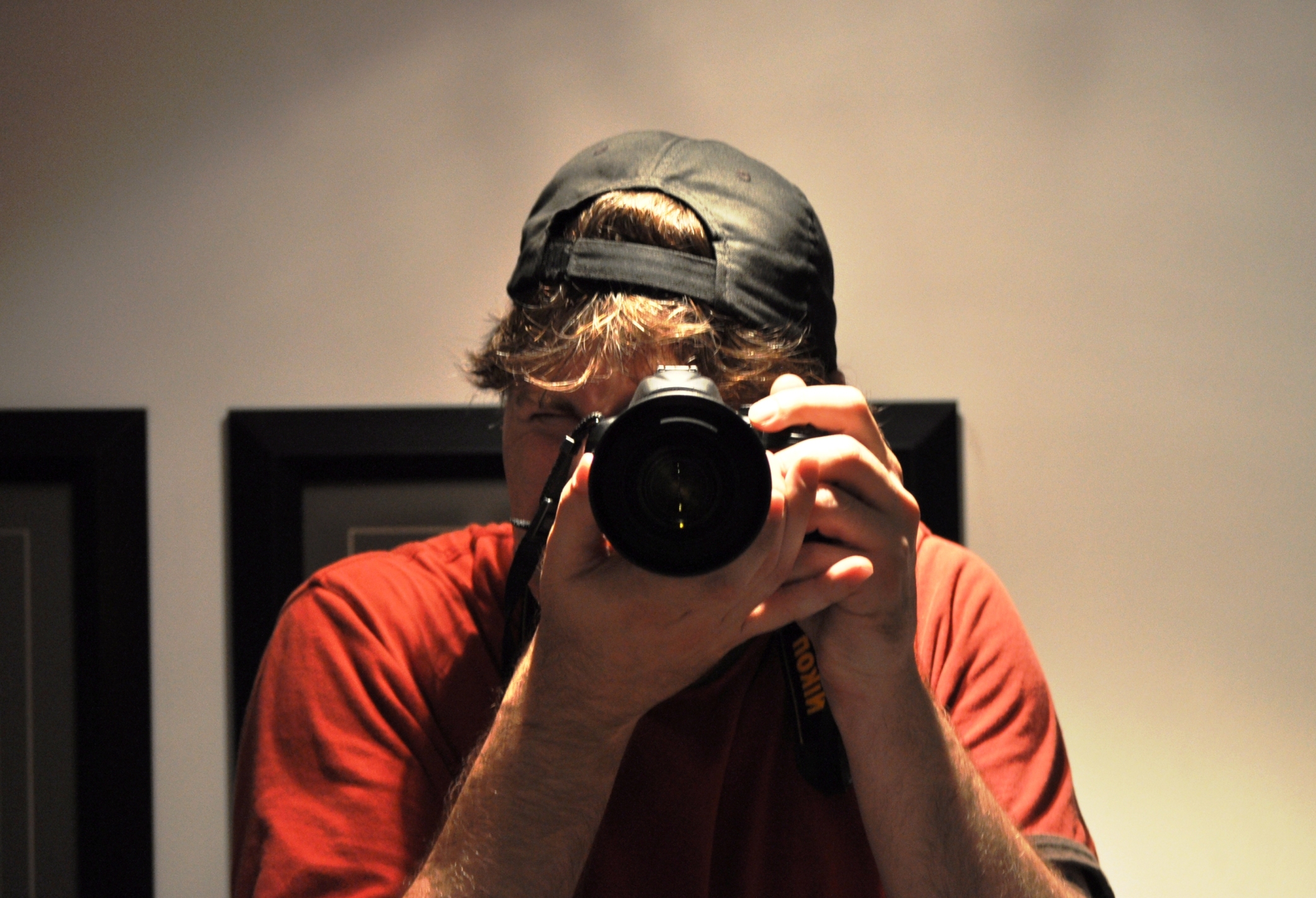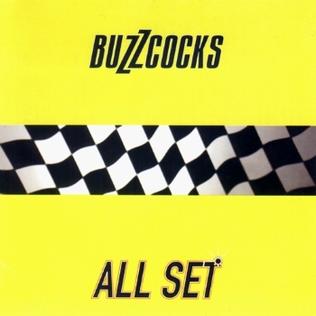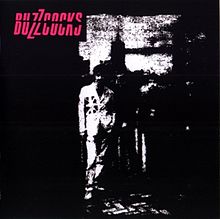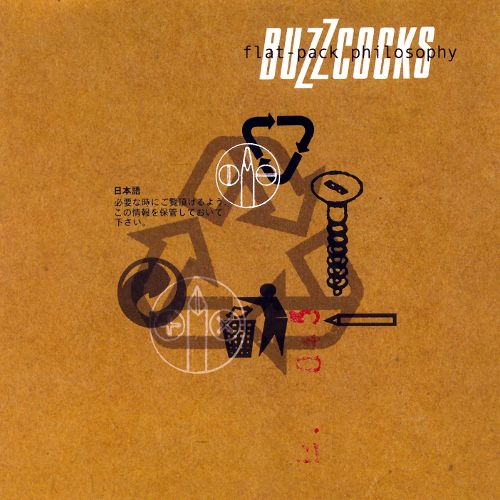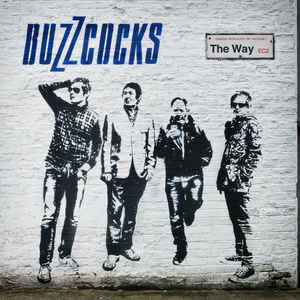Harmony in My Head: A Buzzcocks Retrospective
Click below on the streaming service of your choice to listen to the playlist as your read along.
This profile has been prompted by the recent and untimely passing of Pete Shelley, the primary singer and song writer of the Buzzcocks, one of the earliest, greatest, and most influential of the British punk bands. The band has carried on, leaving Steve Diggle as the only remaining original member, and the legacy of Shelley and the rest of the band is strong, and always worth celebrating.
The Playlist
Breakdown
Boredom
Orgasm Addict
What Do I Get?
Fast Cars
Get on Our Own
Love Battery
I Don’t Mind
Fiction Romance
Autonomy
Moving Away from the Pulsebeat
Noise Annoys
Ever Fallen in Love (with Someone You Shouldn’t’ve)
Just Lust
Love is Lies
Nothing Left
E.S.P.
Late for the Train
Promises
Why Can’t I Touch It?
Harmony in My Head
Paradise
You Say You Don’t Love Me
Mad, Mad Judy
I Don’t Know What to Do with My Life
Hollow Inside
A Different Kind of Tension
I Believe
Do It
Innocent
Isolation
Last to Know
Without You
Friends
Driving You Insane
Sick City Sometimes
I Don’t Exist
People Are Strange Machines
The Way
Saving Yourself
The Buzzcocks were born as part of one of the most legendary moments in rock history. In the summer of 1976 the Sex Pistols conducted a shambolic tour of the UK. In Manchester, a couple lads who had seen the Sex Pistols play in London were keen to try their hand at this new, aggressive form of rock music and set about forming a band. They took the lead in promoting The Sex Pistols’ Manchester show and slotted their nascent band as the opening act. The young men were Pete Shelley and Howard Devoto (whose real names were Peter McNeish and Howard Trafford), fellow students at the Bolton Institute of Technology, and they called themselves Buzzcocks, taken from a magazine quote, “It’s the buzz, cock!” (‘buzz’ being excitement while ‘cock’ was slang for a mate). The show with the Pistols was to be their big break, or so they thought.
On June 4, 1976 The Sex Pistols played the Lesser Free Trade Hall in Manchester. Devoto and Shelley couldn't get their band together in time and so the Buzzcocks didn't play after all, waiting instead to open for the Pistols at another show a month later. Accounts vary, but it is estimated no more than 18 people attended the Lesser Free Trade Hall show (it wasn’t even a big break for The Pistols). However, as time went on it would seem anyone in Manchester at the time claimed to have been there. This moment in history has been featured in two movies (24 Hour Party People and Control) and had a book written about it, I Swear I Was There: The Gig that Changed the World. BBC Channel 4 decreed it one of the three most important gigs in the history of rock n' roll. Why? Almost everyone at the show, inspired by The Sex Pistols performance, went on to shape the music scene of England for the next fifteen years and in an instant launched a modern rock wave out of Manchester; and it all came about because of Shelley and Devoto.
Breakdown; Boredom \ Spiral Scratch EP (1977)
The duo had formed the band in early 1976 and played a few gigs with a drummer prior to the Pistols’ show, but the others dropped out which is why they didn’t have a line-up to play at the Lesser Free Trade Hall show. By the time they opened for the Pistols a month later they’d brought on Steve Diggle on bass and John Maher on drums. The band participated in the legendary 100 Club Punk Festival in London in the fall of 1976, one of the defining, momentum building moments in punk history.
By the end of the year they’d recorded their first EP, Spiral Scratch, and released it in January of 1977 on their own indie label, New Hormones, making them one of a few ground breakers in taking the punk DIY ethos to that extent. The 4-song EP was full of the pure punk energy and raw guitar-driven sound of the early UK punk genre. Devoto’s distinctive vocal offset the thick guitars, rapid drumming, and rolling basslines of the music. The EP was produced by Martin Hannett (who was also at the Lesser Free Trade Hall show), who would go on to be one of the most prolific producers of the Manchester punk and post-punk genres through his work with Joy Division and many other Factory Records artists.
It was immediately apparent listening to these songs that the Buzzcocks had a catchy vibe that linked the punk sound to the more accessible power-pop sounds also germinating at the time. The EP reached #31 in the UK chart making it one of the earliest punk releases to gain commercial success. “Boredom” became an early iconic song of the punk scene, marked by the repeated two-note guitar solo and sardonic lyric and send-up of pop music, “ba-dum-ba-dum.”
Orgasm Addict (1977); What Do I Get? (1978)
As hinted by “Boredom,” the band was already finding the punk scene a bit spent over the course of 1977 even though new punk bands were exploding all over Britain. Howard Devoto wanted to move away from the sound and left the band just as the initial EP was being released. He would form the band Magazine a year later and issue many fantastic, defining post-punk albums.
Shelley took over on vocals and Steve Garvey joined on bass, with Diggle moving to guitar, and the band signed to United Artists. They recorded and released their first single before the end of the year, “Orgasm Addict.” Originally written by Devoto and Shelley the song was banned by the BBC for its sexual content, which was understandable given lyrics like, “You get in a heat, you get in a sulk / But you still keep a-beating your meat to pulp / And you're an orgasm addict, you're an orgasm addict.” As a result, the song didn’t do well despite being an outstanding track. Delivered at a breathless pace (to match the content, no doubt), the rolling bassline and driving guitars made it catchy as hell.
The next single, “What Do I Get?” was the first written solely by Shelley and released in February of ’78. With less controversial content it would reach #37 on the UK singles chart and bring greater notice to the blossoming brilliance of this band. “What Do I Get?” is one of the greatest songs ever written of any genre, and certainly one of the most defining songs of the punk genre. My favourite songs tend to be even-tempo and carried by strumming guitars, and this is a consummate example. Like “Orgasm Addict,” it was another consistently fast-paced song, and had a wonderful, catchy melody carried by Shelley’s distinct vocal (higher-pitched than Devoto’s) and Diggle’s strumming power chords, Garvey’s lively bass, and Maher’s frenetic drumming – all delivered in a tidy three minutes. It was an infectious formula.
If anyone ever dares to dismiss punk music as the amateurish thrashing of miscreants just listen to the drumming and bass in “What Do I Get?” and how tightly the rhythm section is married to the vocals and guitar through the changes and chorus, and all at a furious pace. These guys could play. Indeed, these two singles marked the evolved and talented musicianship of the band under its new line-up and their pop-punk groove pushed the band to the forefront of the punk movement.
Steve Garvey; Steve Diggle; Pete Shelley; John Maher
Fast Cars; Get on Our Own; Love Battery; I Don’t Mind; Fiction Romance; Autonomy; Moving Away from the Pulsebeat \ Another Music in A Different Kitchen (1978)
The Buzzcocks released their first full album, Another Music in a Different Kitchen, in March of 1978 and continued to build on their impossibly addictive style. The album was produced by Martin Rushent, who had also produced the preceding singles, and was helping define the UK punk scene through his work with the Buzzcocks, The Stranglers, and Generation X. He perfectly captured in the studio the band’s energy and impeccable melodies. The album has nary of moment of imperfection over eleven songs and 36 minutes and runs at a relentless pace, with only the sixth song, “Sixteen,” offering a slight break with a mid-tempo, marching cadence before reaching the mid-tempo and extended intro to the last song, “Moving Away from the Pulsebeat.”
Shelley wrote every song, with Devoto and Diggle co-credited on three each. The album featured instantly memorable punk anthems like “Fast Cars,” “I Don’t Mind,” “Fiction Romance,” and “Autonomy.” “I Don’t Mind” and “Moving Away from Pulsebeat” were released as singles, with the former reaching #55 on the chart. The album would get to #15 on the UK albums chart and today is recognized as one of the greatest albums of the modern rock era.
While The Sex Pistols were imploding and The Clash were refining their sound with reggae influences and political messages, The Buzzcocks were quietly amassing the most consistent and impressive list of punk songs.
Noise Annoys \ B-Side to “Love You More” (1978)
Ever Fallen in Love (with Someone You Shouldn’t’ve); Just Lust; Love is Lies; Nothing Left; E.S.P.; Late for the Train \ Love Bites (1978)
The album was followed with another single, “Love You More,” that over time ended up with the B-side, “Noise Annoys,” becoming as known. “Love You More” was another solid song with a ‘60s retro-pop sound, but “Noise Annoys” showed how the band was developing away from their pure two minute sprints of songs. It had more drum and bass sections, catchy breaks, and varied between mid-tempo pop, and chaotic post-punk sequences.
Before the year was done they would release their second album, Love Bites, featuring their most accessible song yet, “Ever Fallen in Love with Someone (You Shouldn't've).” With other songs from the album, such as “Love is Lies,” their sound, while still powerful and raw, was showing better harmonies and more polished song writing with greater versatility (including acoustic guitar for the first time). The album didn’t quite match the overall perfection of the first but was still another fantastic eleven songs over forty minutes. Bands like the Buzzcocks make the case that brevity can deliver as much impact as longer, more involved compositions. Punk was, at its core, a rejection of the pomposity and extravagance of the classic rock bands of the ‘70s, and the Buzzcocks were emblematic of this spirit.
The sound of the album varied in pace more than the debut and didn’t have quite the same line-up of instantly catchy songs but did offer hook-filled gems like “Just Lust,” “Nothing Left,” “E.S.P.”, and the riff-rocking guitar and drum fun of the closing, instrumental track, “Late for the Train.” The album would peak higher than the first album, reaching #13 in the UK, and the album’s only single, “Ever Fallen In Love…” would give them the highest charting song of their career, reaching #12. The song is likely their most defining tune, carried higher in popularity due to the Fine Young Cannibals’ cover in 1986, whose version reached #9 in the UK and received good exposure in North America, something the Buzzcocks were never able to achieve.
Promises (1978)
Why Can’t I Touch It? \ B-side to “Everybody’s Happy Nowadays” (1979)
Harmony in My Head (1979)
Over the course of the next year and prior to releasing the third album, the Buzzcocks released three singles which would all chart reasonably well: “Promises” (#20), “Everybody’s Happy Nowadays” (#29), and “Harmony in My Head” (#32). The songs continued the band’s progression into fuller, melody-driven punk and power-pop songs. The B-side to “Everybody’s Happy Nowadays” was the wonderful, “Why Can’t I Touch It?,” (which was used in a Nissan car commercial in 2006 and also appeared in an episode of Entourage in 2009), which brought Steve Garvey’s wonderful bass playing to the forefront.
My t-shirt
In “Harmony in My Head” the band had another iconic song, this time written and sung by Diggle. His lower-pitched and angrier delivery gave the band a different sound, and with Shelley’s harmonies and the song’s tight, catchy melody it made for an epic punk-rock song. When I saw the band in Toronto in 2016, they finished the show with a huge version of it and Steve Diggle wore a t-shirt with the song’s name on it, which I loved. I went out the week after and had a t-shirt of my own made, wearing ‘Harmony in My Head’ as a tribute to the band and the song and also as a grounding ethos.
Paradise; You Say You Don’t Love Me; Mad, Mad Judy; I Don’t Know What to Do with My Life; Hollow Inside; A Different Kind of Tension; I Believe \ A Different Kind of Tension (1979)
In late 1979 the Buzzcocks’ third LP, A Different Kind of Tension, was released. It was again more polished and complete an album than what they'd issued the year before. “You Say You Don't Love Me” displayed Shelley's evolving maturity with melody and “I Believe” gave us, at over seven minutes in length, one of punk's few epic and anthemic songs in the classic rock vein. Yes, “Moving Away from the Pulsebeat” clocked in at over seven minutes too, but reached that length after a break and then a repeated refrain and extended outro, not really making it a complete song in the same way “I Believe” was; the core of “Pulsebeat” was about five minutes, still long for the band and especially on that first LP.
A Different Kind of Tension was again a neat package of forty minutes despite one extra song with twelve tracks (the final song, “Radio Nine,” was just a 41 second outro and not a proper song, comprised of radio-sounding snippets of some of the band’s songs). The style was still built on the band’s punk foundations but there were post-punk elements making the album a bridge to the genres that came after. “You Say You Don’t Love Me” was almost a new wave-punk song, “Mad, Mad Judy” was a rhythm based punk throwback, “Money” and “Hollow Inside” were post-punk, dark-pop songs that could have fit on a Joy Division album. And in the album’s climax (setting “Radio Nine” aside), the extended jam to “I Believe” blended punk and classic rock to create a stadium-worthy rocker.
In the same month as the album’s release, a collection of the band’s singles up to that album was released, Singles Going Steady, which given the stellar collection of songs the band had over the prior two years made for a great album. Surprisingly, it didn’t chart. Likewise, neither of the singles (“You Say You Don’t Love Me” and “I Believe”) from A Different Kind of Tension charted and the album peaked in the UK at #26, below the first two albums. It did crack the top 200 in the US and the band did their first North American tour, but interest was lukewarm and the band didn’t make an impression.
The band then started recording for the fourth album but was straining after a hectic schedule for the past three years and decided to ease off their schedule. Perhaps there was frustration that, with punk waning and the music world splitting into a multitude of directions, the band was losing momentum or couldn’t find a way to evolve to another sound? Regardless, in 1981 Pete decided to go solo and the Buzzcocks closed up shop. The others went on to perform in other acts sporadically over the 1980s. Pete had a pretty big hit in Canada in 1981 with “Homosapien,” a song that spoke to his bisexuality ("Homo superior/In my interior", though Pete denies this was a homosexual slogan). Surprisingly the song embraced the synth-electronic sound that was dominating the charts that year, taking the Buzzcocks sound into a synth-new wave direction. The song was originally written pre-Buzzcocks and was at one time intended as a Buzzcocks song. So perhaps the answer to the question above was that Shelley could only do such a song free from the constraints of the band and their core sound.
Do It; Innocent; Isolation; Last to Know \ Trade Test Transmissions (1993)
Perhaps buoyed by the revived interest in punk and aggressive rock thanks to grunge music and a broader return to guitar-rock in the late ‘80s and early ‘90s, Shelley and Diggle, along with hired hands including Mike Joyce, ex of The Smiths, reunited in 1989 as the Buzzcocks. In 1993 they released their first LP in 14 years. The album was overlooked, not charting and relegating the band to touring in small venues (they played Lee’s Palace in Toronto) or as an opening act, a slot they filled for Nirvana’s 1994 tour. Ignoring the comeback album was a mistake by fans of modern rock because it was a fantastic pop-punk album.
From the opening chords of the lead track, “Do It,” it was immediately clear the Buzzcocks were essentially picking up where they’d left off on A Different Kind of Tension, unveiling one catchy, guitar powered song after another with modern production and polish. Along with “Do It” songs like “Innocent,” “TTT,” and “Last to Know” fit comfortably into the band’s older discography. The single from the album was Steve Diggle’s, “Isolation,” another fine song but that suffered a little from being a bit too smoothed over. In that regard fans and critics accepted the quality of the album but wouldn’t acknowledge it as meeting the standards of the band’s first three albums; such is the plight of older, established, influential acts, it’s near impossible to keep surprising and enthralling fans well into a career. But I still think if you put “Do It” or “Innocent” on a mixed tape with their earlier stuff a casual listener wouldn’t have picked them out as being any less than the others.
I admit that the Buzzcocks had come and gone before I got into my music listening years and, perhaps because my brother wasn’t a fan of punk, they mostly slipped under my radar until I went back in the early 1990s and schooled myself on the original punk era. It was then that the brilliance of the Buzzcocks came to my awareness and I was pulled to them far more than any other punk act of the era. I was happy to pick-up Trade Test Transmissions and listened to it extensively the year it came out.
Without You \ All Set (1996)
Friends; Driving You Insane; Sick City Sometimes \ Buzzcocks (2003)
I Don’t Exist \ Flat Pack Philosophy (2006)
People Are Strange Machines; The Way; Saving Yourself \ The Way (2014)
The Buzzcocks went on to release four more albums and tour regularly over the last fifteen years and still had shows booked into 2019 at the time of Shelley’s death. It created an odd imbalance in which their second career was longer and produced more music than their original, best known and most revered stint.
The band’s output over the later albums has been inconsistent and their sound has become too consistent and bland over time. There have been many good songs, but far too many forgettable ones. 1996’s All Set is probably their weakest album, with the songs lacking the bite and catchiness we expect of them, while 2003’s Buzzcocks was much better, as was what will turn out to be their final album, 2014’s The Way. They will interestingly close their discography with the final song, “Saving Yourself,” another anthemic tune with the lyrics, “A sound of breathing deep inside / A sense of losing a sense of pride / There's a question not answered yet / Things to remember, things to forget / Its all about saving yourself / Saving yourself from desire / In this world of control and the flames getting higher.”
Despite advancing in years, they still played ear-splittingly loud and I was thankful to catch them in concert in 2014 (at Riot Fest in Toronto), 2015, and 2016. While all the shows were great I do have to admit my enthusiasm and enjoyment lessened each time (the 2016 show was not well attended). Shelley never was a very dynamic front man but thankfully Diggle was very expressive and could play in a very showy way – it always looked like he was having a blast up there – and when the shows would lag he could help bring up the energy. It’s a challenge in the modern world of music when artists must tour to make money. Taking a year off means making no money, even if new songs and albums are issued. As a result fans can often see their favourite acts, of old and new, frequently. It leads to the risk of burnout for artists and fans alike. Maybe the Buzzcocks toured constantly knowing their time was limited to do so, but given their lifelong lack of sales, I suspect economics were at play.
Diggle and Shelley (centre left and right) in more recent times
The Buzzcocks were the best of the British punk scene because of their great sound and unbelievable consistency. Over their three early albums there really wasn't a bad song. While The Clash, The Damned, The Jam, and others of the era had more prolific and celebrated careers and lasted well into the ‘80s, their sounds evolved away from punk and can't really be defined as career punk acts in the way you can with the Buzzcocks. Their lack of politics and controversy has also relegated them to a less substantial place in musical history, but that takes nothing away from their superior music. They defined and pushed the British punk sound as it evolved into the post-punk era and were hugely influential on the pop-punk sounds that would evolve in the early ‘90s, with bands like Nirvana and Green Day citing them as influences, and Seattle grunge band, Love Battery, took their name from the Buzzcocks song. Pete Shelley belongs in any list of the greatest song writers and performers of British rock music, and with Diggle, Garvey, and Maher rank among the top pioneers of modern rock.
